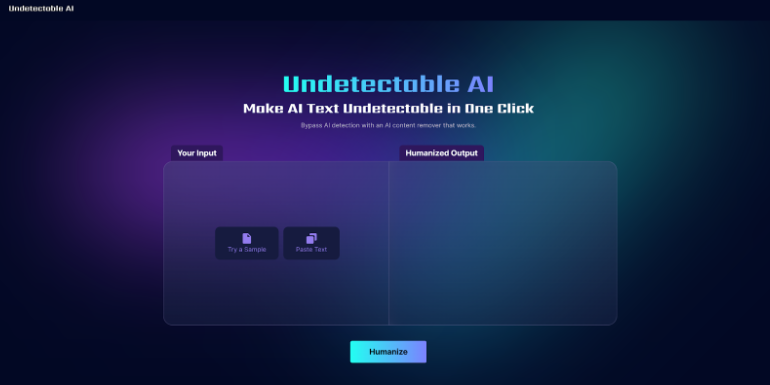Contents
Introduction
Artificial Intelligence (AI) has become an integral part of our daily lives, from the voice assistants on our phones to the algorithms that power social media platforms. As AI technology continues to advance, so does the need to ensure its security and trustworthiness.
With the rise of deepfake videos and AI-generated content, there is a growing concern about the potential for AI to be used maliciously. To address this, a new tool called Undetectable AI has emerged, claiming to be able to fool even the most advanced AI detection tools. In this review, we will explore the capabilities of Undetectable AI and examine whether it can truly deceive AI systems like GPT Zero.
Understanding AI Detection Tools
Before diving into the discussion of Undetectable AI, it is crucial to understand how AI detection tools work. These tools are designed to identify AI-generated content and distinguish it from human-created content. GPT Zero, developed by OpenAI, is one such advanced AI model that has been trained on a vast amount of text data to generate human-like content. Through training, GPT Zero has acquired the ability to predict the most likely next word in a given context, producing remarkably coherent and contextually relevant text.
AI detection tools typically rely on statistical analysis, pattern recognition, and machine learning algorithms to differentiate between AI-generated content and human-created content. By analyzing various linguistic and contextual features, these tools aim to reveal the underlying patterns and characteristics unique to AI-generated text. However, as AI models like GPT Zero continue to improve, so do the methods used to circumvent detection.
Introducing Undetectable AI

Undetectable AI, developed by an undisclosed team of researchers and developers, claims to have created a tool that can generate text indistinguishable from human writing, effectively fooling even the most sophisticated AI detection tools. According to their website, Undetectable AI utilizes advanced algorithms and techniques to mimic human-like behavior, employing context-awareness and storytelling abilities to craft coherent and persuasive narratives.
The potential applications of Undetectable AI are both intriguing and concerning. On one hand, it could prove beneficial in scenarios where generating high-quality human-like text is desired, such as writing assistance tools, content creation, or language learning applications. On the other hand, the misuse of Undetectable AI could lead to the proliferation of disinformation, fraud, or automated spamming on a large scale.
Evaluating the Claims
To assess the claims made by Undetectable AI, it is essential to subject it to rigorous testing and comparisons with existing AI detection tools. While Undetectable AI’s website provides some sample outputs, a more comprehensive evaluation is necessary to determine its efficacy in fooling sophisticated AI models like GPT Zero.
Researchers and developers at OpenAI, known for their pioneering contributions in the field of AI, have released several AI detection models aimed at identifying machine-generated text. These models, such as gpt-3-davinci and contentFilter-any, have achieved impressive accuracy rates in detecting AI-generated content. Comparing Undetectable AI’s output with these models could provide valuable insights into its capabilities and limitations.
To learn more, you can read this review of Undetectable AI.
Practical Applications and Ethical Implications
Beyond the potential for fooling detection tools, Undetectable AI has practical applications in various industries. Content creation platforms could utilize the tool to augment human writers, increasing productivity and expanding their capabilities. Language learning applications could benefit from the language generation abilities of Undetectable AI, providing learners with authentic and immersive language experiences.
However, the ethical implications raised by Undetectable AI cannot be ignored. The ease with which it can generate human-like text poses challenges for the verification of online content. It opens the door for the creation and distribution of fabricated news articles, malicious propaganda, or even impersonation attempts. Without proper safeguards and regulations, the potential misuse of Undetectable AI could have far-reaching consequences on society’s trust in digital content.
Limitations and Challenges
While Undetectable AI’s claims are intriguing, it is important to acknowledge its limitations and the challenges it faces. The effectiveness of Undetectable AI in fooling AI detection models could vary across different contexts and datasets. Detecting AI-generated content is an active field of research, and detection models are continuously evolving to identify increasingly sophisticated techniques.
Additionally, the widespread adoption of AI detection tools and advancements in AI model architecture could present challenges for the long-term viability of Undetectable AI. As AI detection technology improves, it is likely that countermeasures will be developed to identify patterns indicative of AI-generated text. It becomes a constant cat-and-mouse game between the creators of AI detection tools and the developers of tools like Undetectable AI.
Conclusion
Undetectable AI’s claim to fool GPT Zero and other AI detection tools is a striking development that raises both excitement and concerns within the AI community. While Undetectable AI shows promise in its ability to generate human-like text, rigorous testing and comparison with existing detection tools are necessary to validate its claims. The debate surrounding the use of AI detection tools and tools like Undetectable AI underscores the need for ongoing research, regulation, and ethical frameworks to guide the responsible development and deployment of AI technologies.
As AI advances and becomes more prevalent in our lives, it is crucial to consider the societal implications of tools that can deceive detection systems. The impact on digital misinformation, online security, and the erosion of trust require us to approach these developments with caution. While Undetectable AI may have practical applications, we must balance innovation with the need for ethical considerations and safeguards to ensure AI serves the betterment of society as a whole.